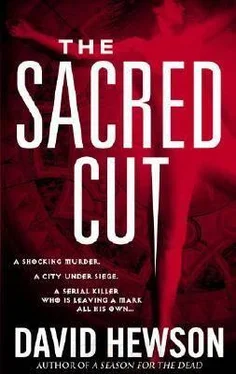Peroni waited till he heard the door close. Then he did his best to push back the feeling of nausea and the pain in his head, tried to concentrate, to think straight.
“Gianni?” the girl whispered, keeping close to him, shivering with the growing cold. “What do we do?”
“We wait, Laila,” he answered, with as much assurance and certainty as he could muster. “We wait a while. Just like the man said. Then we get out of these things and go somewhere nice and warm and comfortable. My friend’s place maybe. It’s not far away. Let’s sit down, huh?”
He found his way to the floor, the girl following him. Peroni closed his eyes and wondered how badly he was hurt, wondered too at the American’s closing words. Maybe the body in the car was just a taste of what was to come: random, shocking acts, designed to persuade Leapman to do the right thing. Maybe the killer had something nastier in store just to hammer home the message.
“Gianni,” the girl whispered.
“Just give it a minute,” he groaned. His head was spinning. His face hurt like hell.
Then something intervened, some semblance of sleep.
When he came to, jogged by a push from the kid, the place was different, noticeably colder and darker too. A stream of snow still circled down through the oculus. Laila had her head bent over their wrists, working at something.
“How long was I out?” he asked.
“Long time,” she said and looked up at him, half smiling. “Doesn’t matter now.”
Her mouth and her right wrist were covered in blood. Peroni saw in an instant what she’d done: spent all the time he was unconscious biting and wriggling at the plastic of her cuffs, working the flexible material over and over until she found a way through.
She stood there, half guilty, half wondering whether just to flee again. That was her natural instinct.
“That’s good,” Peroni said confidently, as if he hadn’t a clue what she was thinking. “If you reach into my jacket pocket,” he continued, “you should find a penknife there. It’s in a little compartment with a zip on it. You should be able to get at it now.”
There was a moment of hesitation, then her slim hand angled its way into his coat, an easy, familiar motion, and came out, so quickly, with the knife. And his wallet.
“Laila.”
The kid was crying. Real tears, streaming down her cheeks, more than he’d seen when the two of them faced the American, more than when they both knew they were so close to losing their lives.
“Not now,” he pleaded. “I need you to help me. I need you .”
Then she said something that made his blood run cold. Something straight from the American, said it with the same fervour, the same darting eyes looking everywhere.
“Busy, busy, busy, busy…”
A part of Peroni wanted to believe you could heal a damaged child with nothing but love and affection and honesty. But Teresa was surely right. It went deeper than that. Laila suffered from an illness, a malady as real as a fever, more damaging since it lurked inside her, unseen, unfathomable, misinterpreted by an icy, suspicious world.
Peroni turned and raised his painful wrists.
“Get busy with these, huh?” he murmured.
“Then?” she asked.
“Then we get you something to eat. And a comfortable bed. Your uncle Gianni’s got work to do. You’ve saved his skin tonight, you know.”
“I did?” she asked, only half believing him.
“You sure did. You’re not going to leave me here like this, are you?”
She thought about it, but not for long. Then she opened the knife and started to saw at the plastic.
Ten minutes later Peroni had freed the terrified caretaker, who was locked inside a portable office by the side of the building.
After that, he called Leo Falcone.
UPSTAIRS, IN THE RUSTIC, faded bathroom, Emily Deacon stood before the flaking mirror and peered at herself, trying to find answers for questions she couldn’t quite begin to frame.
She was never good at relationships and she knew it. Getting close to someone was like a drug. It solved so many problems but it had side effects too. Commitment left the window open for pain to blow in like poison on the breeze. It made the inevitable parting even harder, turned friends into enemies. She’d felt this way, seen this attitude blight her tentative, stumbling efforts at building a relationship, ever since she was a kid.
Ever since Rome .
Ever since her dad came back from his turn with the Babylon Sisters, playing out some bloody vaudeville act deep in the desert in Iraq, damaging himself irreparably for reasons that still eluded her but were now getting closer.
Why Dad? Why not someone else? Was he really Bill Kaspar’s boss pretending to be his best buddy? And if so, why did Kaspar feel justified in coming back to snuff out his life inside a beautiful wooden temple in a park in Beijing thirteen years later, carving into his back a shape from an ancient temple outside Babylon? Was he that desperate for revenge ?
She looked at herself in the mirror and said, “Except he didn’t stop.”
If she was right, every last person who’d escaped Iraq thirteen years earlier was now dead. So why was Kaspar still killing? What would stop him?
The answer lay in his obsession. There were attractions in the belief, however crazy, that you could bring order to a life by placing it in the middle of an intricately symmetrical pattern of shapes and ideas. But it was the kind of process that belonged to the lost, the detached, the doomed. Obsession was, ultimately, the easy way out, derogating responsibility to an inanimate, dead simulacrum of perfection, a fake paradise buried inside a tangled whorl of lines and curves. In the real world it was the untidiness, the lack of completeness, the unpredictability of everyday life, that made each day human. That random, unforeseeable force lay at the bottom of a relationship, too. If the magnetism of personal attraction could be rationalized, it couldn’t, she knew, exist.
Was that why she’d always struggled to keep a man? Her insistence for some kind of reason, some element of proof? The face that stared back at her from the mirror had no answers. What she saw was just another part of the riddle. She was still working to shrug off the child Emily, whose earliest memories lay in that different, early Rome, where she’d spent the first ten years of her life believing the world was a bright, colourful heaven, a place of kindness, grace and beauty where the hard decisions were always someone else’s.
Innocence, ignorance-two sides of the same coin.
“You’ve got to grow up sometime,” she told herself. That was why she’d bitten Nic’s head off when he called her “Little Em.” A part of her recognized how apposite it still was.
She washed her face, brushed her teeth, sat down on the toilet seat and held her head in her hands, trying to find a strand of logic that would allow her to go forward.
There was still a missing piece. But she was too damn tired.
She got up, checked her face and hair once more in the mirror, wondered what she really saw there. A scared adolescent? A woman trying to identify herself among all the noise of modern life? Or, more likely, someone halfway between the two, a changeling shifting shapes, wondering what she would be in the end.
Emily Deacon was aware that, for the first time in her life, she was about to take the initiative, to tell a man it was time he took her to bed. Even if nothing happened there except the closeness of sleeping next to another human being.
Scared, in the way she felt when she was a kid, embarking on an adventure beyond the bounds of normal life, excited, intensely awake all of a sudden, she went downstairs.
Читать дальше










